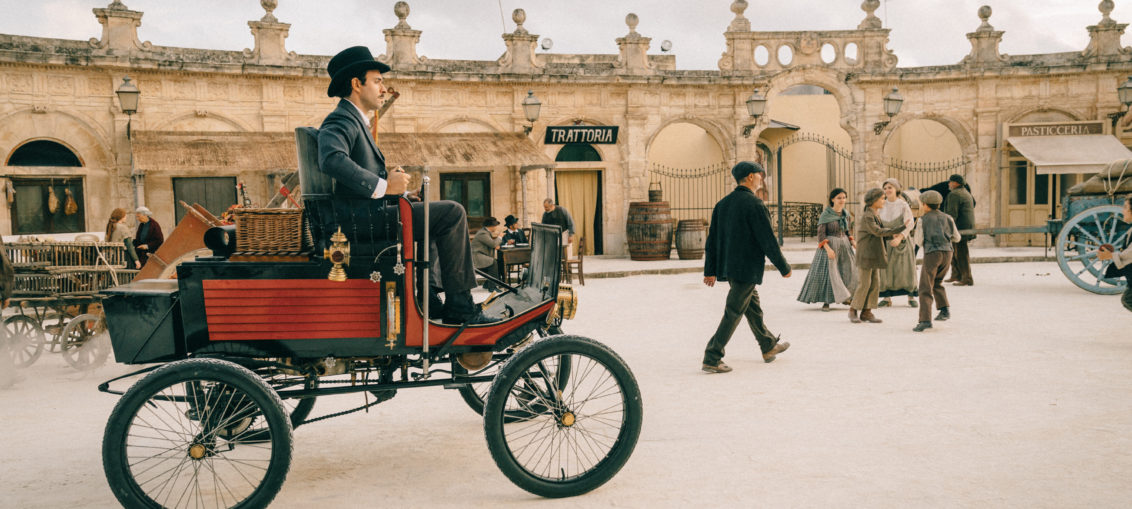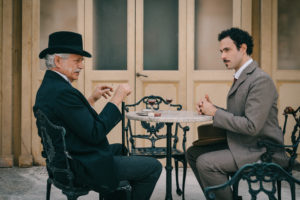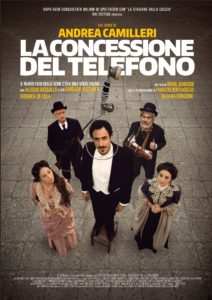
The collection was once Vigata has added a new chapter with the phone concession for the Roan Johnson directed. After the success of the move of the horse and the hunting season, both of which have passed the 30% share, Vigàta the imaginative world created by the magic pen of Andrea Camilleri back on TV, Arena of a new adventure. The granting of the phone, adapted from the historical novel, It brings to the fore the imaginary town, made unique by the imagination of the great Sicilian writer.
Based on the novel by Andrea Camilleri published by Sellerio Edition tells Pippo Genuardi, Born in the Vigàta 3 September 1856, It is a trader of wood. But it is clear: that is not his more jobs, rather, we could say that his real talent is to get into trouble. penniless, ironic, lover of women and technology, Pippo seems to have put his head in place by marrying Taniñe Schilirò, daughter of the richest man of Vigàta, but our hero is just a man who actually never satisfied. And so, sending three letters to the Prefect Marascianno (a Neapolitan paranoid and conspiracy), sets in motion a mechanism that will lead him to be under two crossed fires: the state, who thinks he has to do with a dangerous subversive, and the man "respect" Don Lollo, They start to believe that it is taking to fool Genuardi. To get the coveted "concession phone", indeed, Genuardi be willing to do anything: seek the support of his father, but also of the Mafia; corrupt public officials and betray his old friend Sasa. All under the eyes of the Police Monterchi, came from North, that will keep the dismay and helpless crowds concatenation of events.
 Directed by Roan Johnson, Alessio Vassallo, Thomas Trabacchi, Federica De Cola, con Dajana Roncione, Corrado Fortuna, Ninni Bruschetta and Corrado Guzzanti, with the participation of Fabrizio Bentivoglio
Directed by Roan Johnson, Alessio Vassallo, Thomas Trabacchi, Federica De Cola, con Dajana Roncione, Corrado Fortuna, Ninni Bruschetta and Corrado Guzzanti, with the participation of Fabrizio Bentivoglio
A production PALOMAR in collaboration with RAI FICTION, produced by Carlo Degli Esposti and Nicola Serra with Max Gusberti
So there the director explains Roan Johnson:
"The granting of the phone is the story of three small snowballs (in that film have the form of three letters sent by Pippo Genuardi prefect Marascianno) that, rolling slowly, will become an avalanche that will overwhelm our poor protagonist.
The film is adapted from the novel by Camilleri who is a jewel of engineering fiction. Not only for the structure of the book so original that alternates between the "things written" (letters, documents, newspaper articles) with "such things" (dialoghi dry without descriptions). But also because the story of The granting of the phone is a kind of time bomb hidden under a table, of which the reader and the viewer can only guess the presence. And even the same characters and above all Pippo Genuardi do not feel the ticking, which increases from scene to scene. They think they are the most 'skilled in many, but when they understand to be more stupid than others will be too late.
With the film we tried to pay tribute to this originality of the book by Camilleri, dividing the screen in a natural way to leave a space in which to write the various documents, and looking over with voices and other visual ideas to maintain the strength of how the words on the letters and documents tell things other than what you see or hear. So we tried to tell as the formality of the bureaucracy becomes a vortex in which our protagonist, and perhaps with it the "sense" of the same timeless land where he lives, It will be sucked.
And the joke is that inside the pit of the state and in those coils of the Mafia, the Genuardi it got himself alone. But why is "amminchiato" so much with this devilish phone? We'll find out in just a surprise ending, how he built the Sicilian master, although in the film are seeded evidence of the truth at the same time absurd and obvious lies beneath this whole affair.
 A book and a movie that despite the brilliant and hilarious tone, are a real sarcastic accusations against the distortions and contradictions of Sicily and maybe all of Italy. A comedy about human stupidity (from the institutional and bureaucratic, up to the sentimental) e, at the same time, a social satire and incredible current policy. "
A book and a movie that despite the brilliant and hilarious tone, are a real sarcastic accusations against the distortions and contradictions of Sicily and maybe all of Italy. A comedy about human stupidity (from the institutional and bureaucratic, up to the sentimental) e, at the same time, a social satire and incredible current policy. "
